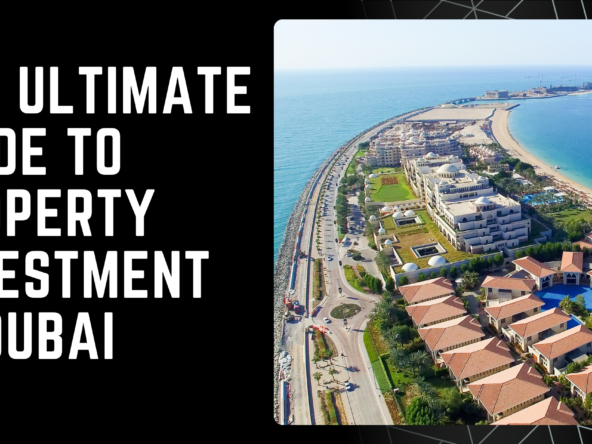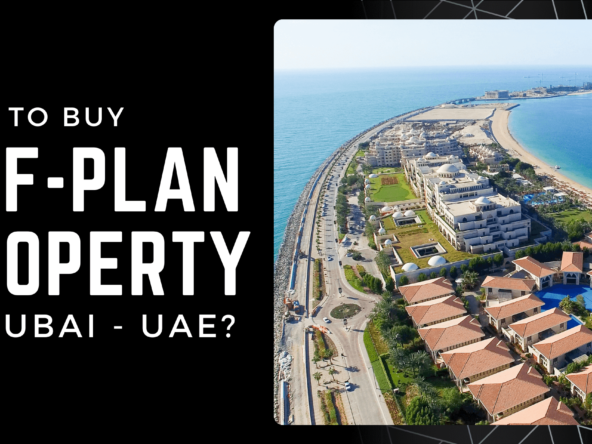Dubai in UAE is a metropolis that is the most sought-after destination for a lot of people, be it a homebuyer, be it an investor, coming from all over the globe. One can find the latest infrastructure, best of the lifestyle in the city, and the ability to get amazing returns on their investments, making the location the most popular investment destination in the world.
But the process for buying a property in Dubai sounds quite intimidating to many. That is why we have come up with a proper guide for the Indian buyers who wish to invest in Dubai so that you get to pick a property, buy it very smoothly. Here is a comprehensive guide that will walk you through every process and it will help you clarify the very commonly asked questions when it comes to investing in Dubai for Indian buyers.
What Is the Process of Buying Property in Dubai?
The process of buying property in Dubai is pretty straightforward but needs a lot of planning and research. Here is the step-by-step procedure for it:
Step 1: Research and Choose the Right Property
The first thing in the process is choosing what type of property would best serve your needs.
Are you looking for residential properties, such as an apartment, villa, or townhouse? Or are you looking at commercial spaces for an investment?
Here are some things to look at during your research:
- Location: A good location to suit your budget and investment should be chosen.
- Budget: Amount that you want to invest with other costs added on, including registration fees, maintenance charges, and taxes.
- Size and Resale Value: Consider the size of the property and its potential resale value. Properties in highly demanded areas provide better long-term returns.
Make sure to visit multiple properties and compare prices and features to make sure that the one you settle for meets your expectations.
Step 2: Engage the Services of an Estate Agent
Shopping in Dubai is uncomplicated by property dealing for non-resident investors. It is simpler to hire a licensed estate agent who understands the Dubai real estate market. A qualified agent will assist you in narrowing the options and making appointments for viewings and negotiating the best deal.
Why hire a real estate agent:
- Market Expertise: An experienced agent will be aware of the current market trends, property prices, and up-and-coming neighborhoods.
- Legal Assistance: Your agent will guide you through all the legal procedures, ensuring you follow the necessary regulations.
- Negotiation Skills: Real estate agents are adept at negotiating prices, ensuring you get the best value for your money.
Ensure that the agent you opt for is registered with the Dubai Land Department (DLD) to ensure that the process goes smoothly and that everything is legal.
Step 3: Funding or Mortgage, if Required
If you are financing your property on a mortgage, you will obviously need one as part of the pre-approval for the mortgage. Several banks within Dubai offer foreign nationals, including Indians, a mortgage. Typically, these banks will advance 75-80% of the property’s value, while the remaining amount is a down payment.
Some knowledge about mortgages:
- Pre-Approval: A pre-approval for a mortgage is well-advised before you set off to begin house hunting. This will let you know your budget and make property search easier.
- Down Payment: For the foreign buyer, the amount on the down payment usually runs between 20% to 25% of the value.
- Eligibility: To qualify for a mortgage you will need a stable income, a good credit score, and a proven history of being responsible financially.
Step 4: Make a Bid and Negotiate the Price
After identifying the house you want to buy, it is time to make a formal offer. Your real estate agent will be instrumental in preparing an offer on the strength of the property value. The seller might be willing to negotiate especially if it is a buyer’s market so do not even think twice about negotiating on the price.
Hints on negotiating :
- Market Research: Do some research on comparable properties in the area to ensure that the price is reasonable.
- Be Prepared to Walk Away: If the price or terms don’t meet your expectations, don’t be afraid to walk away and look for other properties.
Once you and the seller reach an agreement, you can move forward to the next step.
Step 5: Sign the Sale Agreement
After both parties agree on the price, the next step is signing the Memorandum of Understanding, which is a legal document outlining the terms and conditions of the sale. This step is crucial for protecting both parties involved in the transaction.
What to expect at this stage:
- Deposit: A deposit, usually 10% of the property’s price, is usually required at this point.
- Legal Safeguard: An MOU would ensure that the terms of the agreement are in writing and, by law, binding on both the buyer and the seller.
- Payment Structure: The MOU will also detail payment schedules and the final payment which would be due on completion of the sale.
Before signing an MOU, read all the terms carefully and consult a lawyer if necessary
Step 6: Property Valuation and NOC
If you’re financing the purchase through a mortgage, the bank will require a property valuation to ensure that the property’s value justifies the loan amount. Additionally, the seller or developer must provide a No Objection Certificate (NOC), confirming that the property is free from legal encumbrances and can be sold.
Step 7: Change ownership and register property
The last step is the formal transfer of ownership at the Dubai Land Department (DLD). This requires a transfer fee payment, then registering the property in your name so that it legally becomes yours.
What you will do:
Transfer Fee You will pay some sort of transfer fee, usually around 4% of the property’s value.
Title Deed: You will get the title deed after completing the transfer as proof of ownership.
Final Payment: The last payment is towards the seller at this stage.
As a result, you will be sure that the property is registered in your name to start exercising full ownership rights.
Can Indians buy a property in Dubai on loan?
Indians can indeed buy property in Dubai on mortgage. The banking system of Dubai lends to foreign nationals, including Indians, with up to 75-80% financing on the value of the property. You need to have a stable income and good credit score to get a mortgage. The down payment is usually 20-25% of the value of the property.
Can Indians Buy a House in Dubai?
Indeed, Indians can easily buy a house in Dubai. There is no restriction on the foreign ownership of property in Dubai, but this has to be in one of the freehold areas. This includes some of the city’s most sought after neighborhoods like Palm Jumeirah, Downtown Dubai, and Dubai Marina. As an owner, you will have the same rights as any local, so you can either live in the property, let it out to tenants, or sell it as you please.
Can Indians purchase property in the UAE?
Yes, Indians can purchase property in the UAE, particularly in Dubai, as freehold property enables foreign nationals to own property in various regions of the country and is rather easy if there is adequate documentation and finance. Strategically located between Asia, Europe, and Africa, Dubai has become an in-demand location for Indian property investors.
Can we buy property in Dubai permanently?
Yes, the purchase of property in Dubai gives permanent ownership if it is in a freehold area. You will be the absolute owner of the property and can retain it for life. This is not time-bound ownership; you can sell, lease, or pass it on to heirs as you please. There are no restrictions on how long you can hold the property.
What are the Advantages of Investing in Property in Dubai?
- High Rental Yields: The highest in the world; the average yields for prime locations stand at around 6-8%.
- No Taxation on Investment: There is no tax on property, capital gains tax, or income tax on real estate.
- Residency Visa: Purchasers can acquire a residency visa if the purchased property exceeds the minimum required value, now AED 750,000.
- World-class Infrastructure: First-class transportation, healthcare, and lifestyle amenities.
- Strategic Location: Dubai is the world’s global business hub that attracts international companies and professionals.
What Are the Disadvantages of Buying Property in Dubai?
The market is very volatile and hence, property prices are based on economic conditions.
- Service Charges: Annual maintenance charges are applicable to common areas and facilities.
- Tight Residency Rules: Residency visa will be valid only as long as the property is owned.
- Currency Risk: Any fluctuation in the exchange rate between the Indian rupee and the US dollar can impact the cost of investment.
Can NRIs Buy Property in Dubai?
Yes, the purchase of property by NRIs is free and unfettered. Also, if the bank is ready to accept a NRI applicant, a mortgage in Dubai is easily possible.
Is Dubai Cheap in Terms of Property?
The cost of properties is determined by location and type. For example, high-end places like Downtown Dubai and Palm Jumeirah are very pricey, while places like Jumeirah Village Circle and International City are not as expensive. Some properties in Dubai are relatively cheaper than in Mumbai or Delhi.
Is it safe to invest in property in Dubai?
Yes, it is one of the safest cities in the world, with a well-regulated real estate market. The Dubai Land Department has ensured transparency;developers and real estate agents are licensed.
Is Property Expensive in Dubai?
Dubai property is both costly and affordable. Luxury properties cost alot to buy, though they give excellent rental yields and capital appreciation; these include the likes of Palm Jumeirah, Downtown Dubai, and Emirates Hills.
How Much Does It Cost to Buy Real Estate in Dubai?
- Property Rate: As per the location, size, and type, different rates apply.
- Transfer Charges: 4% of property value. This will be paid to the Dubai Land Department.
- Agent Charges: 2% of the property value
- Mortgage Charges: 0.25% of the loan amount as registration charges
- Maintenance Charges: Annual charges for communal area maintenance
How do Indians buy property in Dubai?
It is possible for Indians to buy property in Dubai even from abroad. They can research properties online; they can hire a realtor in Dubai and sign the sale agreement. Many developers are now offering virtual tours and online booking. Therefore, all the payment and paperwork can be managed digitally, hence a smooth transaction.
FAQ’s
1. Can Indian citizens purchase property in Dubai?
Yes, Indian nationals are free to buy property in Dubai without any restrictions in designated freehold areas.
2. What is the minimum amount of property investment required for a residency visa?
You must invest at least AED 750,000 in Dubai real estate to qualify for a residency visa.
3. Can I buy property in Dubai without physically visiting?
Yes, you can buy property in Dubai without visiting it physically through digital platforms and the help of a real estate agent.
4. Does Dubai have property taxes?
No, Dubai does not charge property taxes, capital gains tax, and income tax for real estate.
5. May a non-resident rent their property in Dubai?
Yes, non-residents can rent a property, but the rental is tax-free; however, such lease agreements have to be registered with the Dubai Land Department
6. Easy to resell property in Dubai?
Yes, selling property in Dubai is straightforward, though market conditions and legal procedures may affect the timeline.
7. Can I pay for property through an installment plan?
Yes, many developers offer flexible installment-based payment plans, especially for off-plan properties.
8. Do I need a UAE bank account to buy property?
Not necessarily, but having a local bank account makes financial transactions, mortgage payments, and fund transfers easier.
9. Is renting out my property prohibited?
No, it is not restricted to a significant degree. Rental income is a good source of passive income in Dubai.
10. Can Indians invest in commercial properties in Dubai?
Indian investors can invest in commercial properties located in freehold areas and use the same for business or rent purposes.
11. What are the paperwork processes required for purchasing real estate?
- Valid passport copy
- Emirates ID, if applicable
- Copy of statement showing the proof of funds
- If financing is done, mortgage approval document
12. Is there a minimum age to buy a property in Dubai?
Yes, a buyer must be 21 years of age or older to lawfully buy property in Dubai.
13. Is it possible to inherit property in Dubai?
Yes, property is allowed to be inherited. However, it is advisable to have a will done and registered so that the property is clearly passed to the heirs when needed.
14. What happens if I default on a property loan?
You would lose your house, and they would sell your property to pay off the balance if you failed to pay for your mortgage.
15. May I buy some property for commercial purposes?
Of course, the investor can acquire a commercial property in Dubai, either for operation or investment purposes.
16. Are there some incentives offered to property investors by Dubai?
Of course, it does offer benefits, such as long-term visas for property investors and other perks to attract a buyer.
17. Can I have a co-owner of the property with my partner or family member?
Yes, Dubai does permit joint ownership, so you can buy property with your partner, spouse, or relative.
18. Do I need to take property insurance in Dubai?
No, but insurance is recommended, as you can never tell when you will be exposed to risk.
19. Do I need permission for renovating the property?
Major renovation work required approval from the local authorities because they had rules that must be followed.
20. Does property prices in Dubai fluctuate a lot?
Yes; Real estate costs in Dubai keep on fluctuating according to economies, demand and world market scenario.



